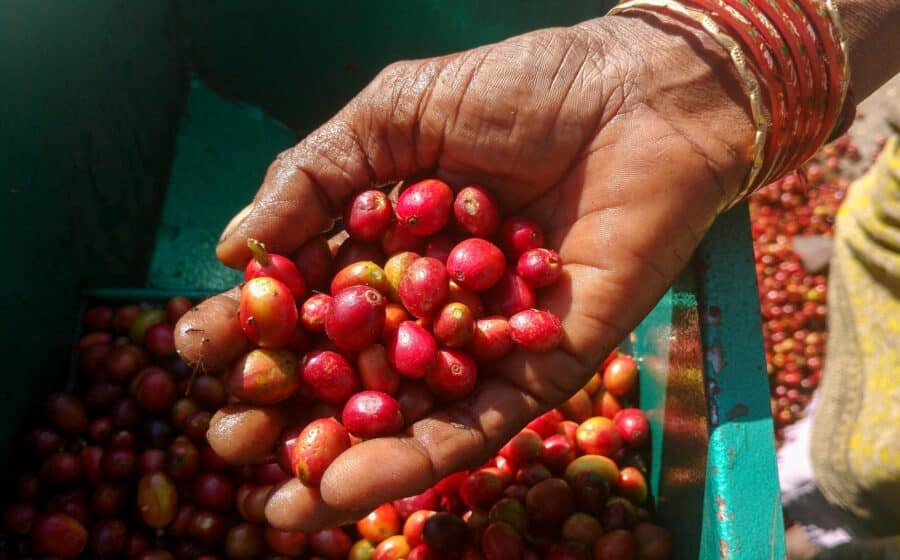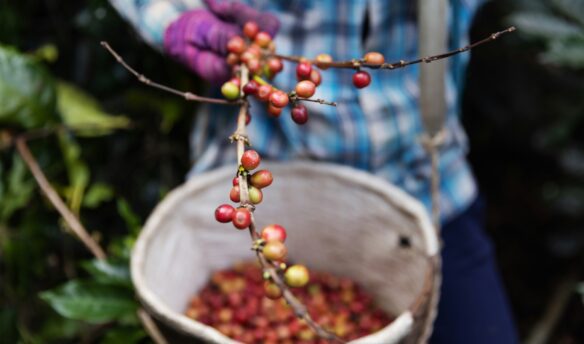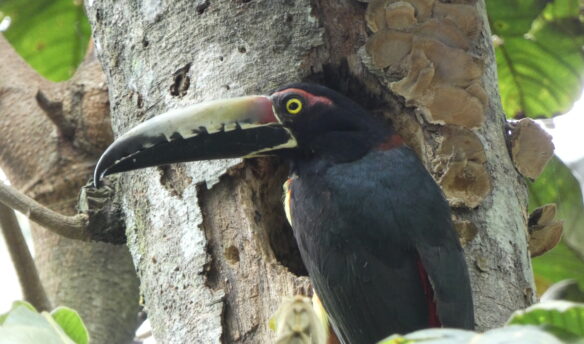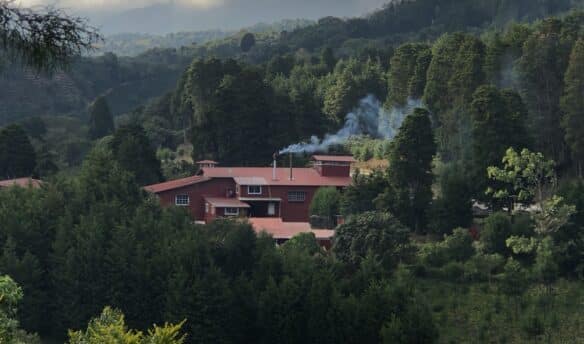For small growers in India, coffee has seldom been a rewarding venture. For every 200 rupees ($2.5) a consumer pays for a cup of coffee in India, growers receive less than a rupee ($0.012). That, coupled with high production costs and the declining prices of green coffee in the international market, means that growers rarely ever make a profit.
On top of all this, intense droughts and unseasonal rains linked to climate change and deforestation are forcing farmers to abandon coffee altogether. At the same time, India’s coffee industry is rapidly expanding: plantations are becoming brands in their own right, specialty coffee startups are growing and expanding all over metropolitan cities, and roasters are winning consumers with innovative brews. Despite this success, the country’s most vulnerable growers are either dropping out of coffee or switching to unsustainable farming practices in the hope of securing better yields.
But recently, a handful of companies have been attempting to challenge this status quo by centering the grower in their operations. Among them is Black Baza Coffee, a Bengaluru-based roaster that sources raw beans almost exclusively from indigenous smallholder growers in southern India and creates a market for their coffee across the country. Founder Arshiya Bose works with some of India’s most marginalized coffee growers, who typically cultivate on just half an acre to a couple of acres of land. Black Baza’s mission enables Bose to work alongside small growers to incorporate regenerative and sustainable coffee cultivation methods while ensuring farmers get a fair price for their efforts.
A Blueprint for Sustainability
Bose, a social scientist-turned-entrepreneur, developed the idea for Black Baza while conducting her doctoral research examining whether coffee certifications improved growers’ livelihoods or encouraged them to adopt eco-friendly practices. Her research, done among farmers in the Kodagu district of the southern state of Karnataka, which produces 70 percent of India’s coffee, concluded they did neither. “The process of getting certified is extremely expensive, and the required paperwork and bookkeeping are not necessarily something that smallholder farmers with their level of education would be able to do,” Bose says.
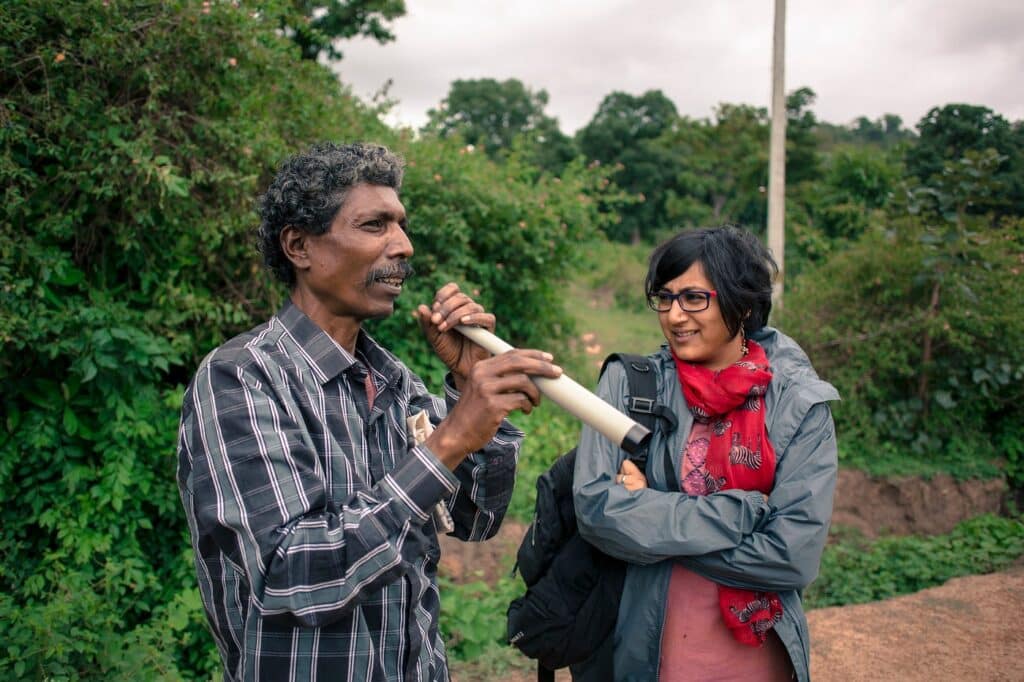
Even when growers incur these costs, certifications don’t guarantee a buyer or a fair price for their beans. “You have to remember that most small farmers in India grow coffee in remote mountain regions and don’t always have access to many buyers. So they sell to the very first buyer they get at whatever price they are offered,” she explains. Bose’s research concluded that global certifications maintain the status quo of exploited and impoverished smallholder growers.
She found the same to be true regarding a certification’s ability to improve or restore biodiversity. Traditionally, Indian coffee growers have followed a complex agroforestry system, retaining native shade trees on their farms. Laws and policies in India also prohibit the removal of forest cover from many parts. “Global environmental certification standards, designed for intensive farming practices followed in Brazil and other parts of South and Central America, are so low that most Indian growers already meet them by default,” Bose says.
With these limitations in mind, Black Baza follows an alternative grower-centric, environmentally sustainable, and incentive-based social enterprise model. Currently, it sources high-altitude arabicas from growers in the Biligiri Rangana (BR) Hills Tiger Reserve in Karnataka and the Nilgiris Biosphere Reserve in Tamil Nadu, and low-elevation robustas from Wayanad, a district in Kerala. As opposed to local traders in these regions who buy beans from small growers on an ad-hoc basis, Black Baza partners with farmers for the long term. They agree with growers to buy their coffee at the end of every season at an above-market price. “When we started working, the price differential between what we at Black Baza were buying coffee at and what the neighboring traders would buy coffee at was about 56 percent. Now we pay 140 percent more,” Bose says.
Our emphasis is on sustainable practices, leaving less of an impact on the soil, biodiversity, treating growers with dignity and respect, valuing their produce, and looking for ways to build all of this into the supply chain. Arshiya Bose, Black Baza Coffee
In addition to the financial incentives, Black Baza helps growers improve quality and yield through integrated farming practices and helps manage pest issues through organic methods. It also gives farmers greater visibility by putting the name of the farm and producer on every bag of coffee it sells. “Our emphasis is on sustainable practices, leaving less of an impact on the soil and biodiversity, treating growers with dignity and respect, valuing their produce, and looking for ways to build all of this into the supply chain,” she says. In return, growers commit to maintain at least 22 different species of native trees and a 60 percent canopy cover on their farms, forgo chemical pesticides, and reduce the use of chemical fertilizers.
Tapping Into Indigenous Agroforestry
Black Baza didn’t simply decide on environmentally- and biodiversity-friendly best practices: Bose says its sustainability standards were developed with growers. Most of the indigenous growers who partner with Black Baza did not cultivate coffee until recently. These traditionally forest-dwelling communities were forced into coffee cultivation in the 1970s and ’80s after the government, under the Wildlife Protection Act of 1972, declared their homes protected areas for wildlife like tigers and elephants and relocated them outside the margins. But having practiced shifting and subsistence cultivation in the forests for millennia, they were able to apply their knowledge of agroforestry to their coffee farms.
Achukkegowda was the first to grow coffee among the indigenous Soliga community displaced after the BR Hills became a reserve forest. “I started in the ’90s by collecting saplings from the nearby coffee estates, and beans dropped by civets and passing wildlife, and planting them in the space between forest trees,” says the 72-year-old whose one-acre farm lies at the edges of the BR Hills Tiger Reserve.
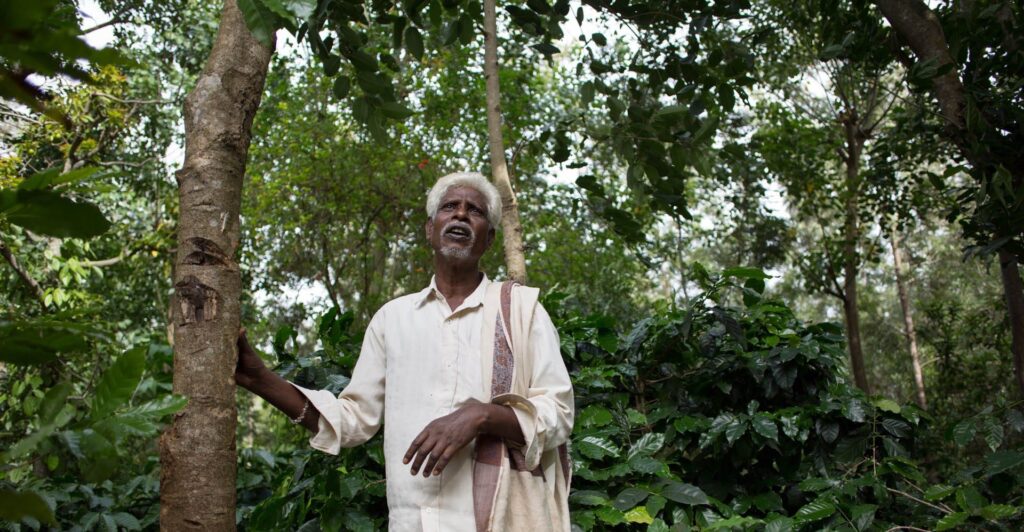
His coffee plants grow under the shade of 138 trees of over 50 different species, including Indian kino, jackfruit, and pepper vines. The biodiversity supports a host of local fauna, some of which hasten the pollination of coffee. The leaf litter and fallen twigs are a source of fertilizer for the farm, as are the droppings of the goats he raises and other wildlife. “Earlier, the Soliga way was to use controlled forest fires to keep weeds and insects in check, but we were not allowed to do that after the forest became a protected area. Now, we lop off the affected branches to get rid of pests,” Achukkegowda says.
Farms like Achukkegowda’s are a win for biodiversity and the environment, but the yield on biodiverse farms can be low. Coffee growing has an inverse relationship with shade: the number of fruits per plant decreases as shade cover increases beyond a certain threshold. It’s understandable that some growers, already suffering due to volatile coffee prices and the effects of climate change, are increasingly switching to sun-grown coffee to increase yields and bring in needed income by selling the timber. Since Indian laws require significant government permissions to cut down native trees, many growers are replacing them with exotic species such as the Australian silver oak. While this may seem better than no tree cover, these species don’t support local fauna and are bad for soil fertility and the quality of coffee.
There is significantly more uncertainty and volatility now than when I started, but…because of that, paying growers a fair price remains non-negotiable. Arshiya Bose
The small growers associated with Black Baza have not been entirely immune to these shifts, but the impact has been limited because of the company’s emphasis on preserving biodiversity. “One of the requirements we created with growers is that we didn’t want any tree species to be more than 20 percent of the whole. You can have silver oak, but it cannot be more than 20 percent of the total number of trees on your farm. We also agreed that the total number of trees on any farm is something like 120 plus per acre,” Bose says. “In one village, growers have committed to never plant silver oak again. Once their existing silver oaks mature, they want to harvest them and plant native trees again.”
When growers prioritize the environment in these ways, they cap how much coffee their farms can yield and, in turn, the amount of money they can bring in. By paying growers a sizable premium over the market price, Black Baza cushions them against such hidden costs—but must pass some of these costs onto consumers. That’s the challenge for Bose. “We are much smaller than most specialty coffee companies,” she says.
Bridging The Gap Between Producers and Consumers
Bose acknowledges that getting consumers to buy into Black Baza’s mission and pay a little more for coffee can be challenging but points out that the company has been able to build a loyal customer base. “People who get our coffee, get it a lot,” she says. She also bridges the gap between consumer expectations and higher prices through offerings and services prioritizing customer convenience. “They like that we custom-grind the beans depending on their brewing equipment and door-deliver within a week of roasting.”
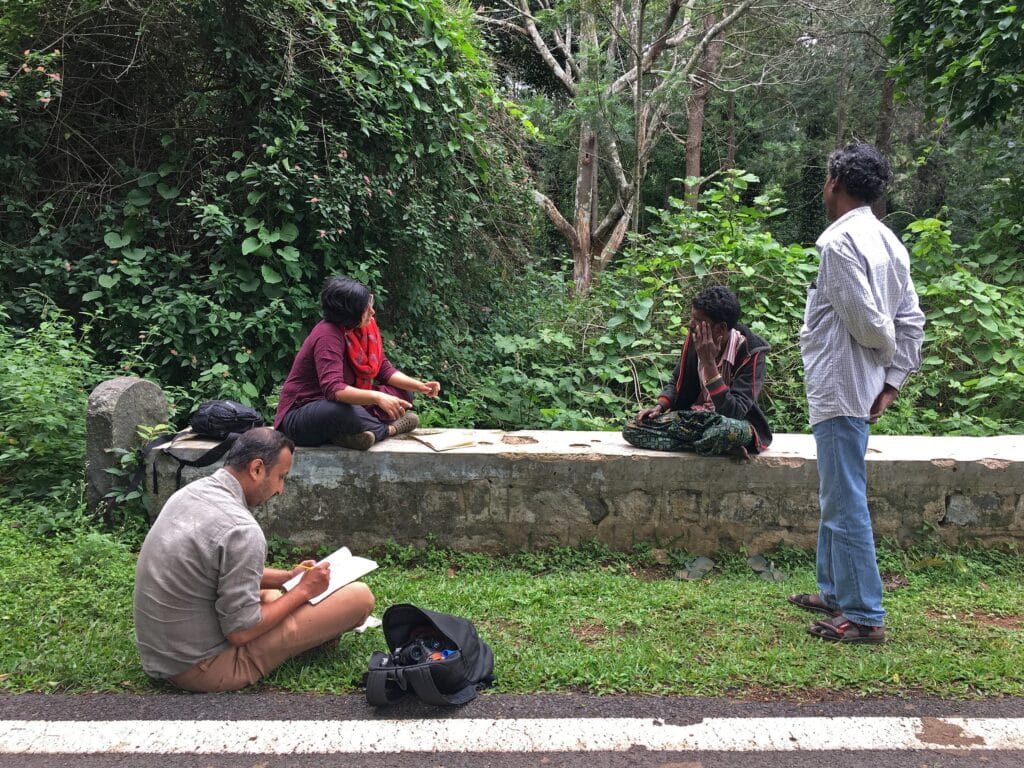
Going forward, Black Baza and its grower partners are bracing themselves and preparing for more erratic weather patterns related to climate change. In 2018, the Kodagu district of Karnataka witnessed massive floods and landslides due to excessive rainfall, which decimated crops in the area. Last year, the region suffered an unexpected dry spell in March, followed by another record-breaking season of rains and flooding that displaced more than 8,000 coffee growers. Uneven weather patterns can result in leaf shedding, lower productivity, and greater vulnerability to pests, and unseasonal heavy rains can cause cherries to burst and drop prematurely, leading to crop losses.
By retaining forest cover on their farms, growers associated with Black Baza have guarded themselves against the worst impacts of climate change. Even then, growers lost 60 percent of their yields last year, but Black Baza remains committed to supporting biodiversity and shouldering the risks many farmers take when investing in sustainable practices. “There is significantly more uncertainty and volatility now than when I started,” Bose says, “but especially because of that, paying growers a fair price remains non-negotiable.”



